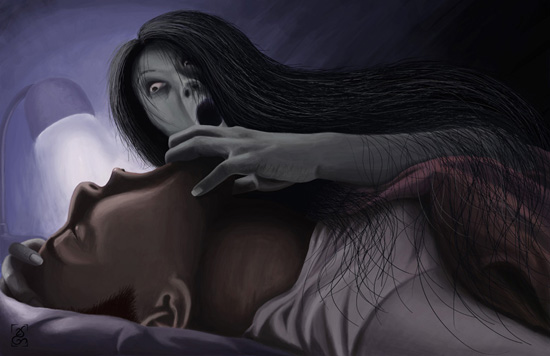I have written previously on how adopting healthier sleeping habits can assist with the control of sleep paralysis, and last night I experienced more evidence to support this theory.
I haven’t experienced an episode for a long time, and have been sleeping very well of late, dropping off as soon as my head hits the pillow and sleeping for 7-8 hours.
Last night, however, I broke this pattern and stayed up late to watch to finish watching a documentary. I didn’t want to break my sleep routine but figured it was Saturday night, so why not – I hadn’t stayed up past 12 p.m. for quite a while, and figured my routine was solid enough to have a late night and readjust the following night without issue.

I got into bed at around 1.20 p.m. and took a while to drop off, most likely because my brain was a little confused by the change in routine, thinking I was planning on staying up late into the night, and as such was adjusting melatonin and brainwaves accordingly.
I felt myself drop into a dream. I was dreaming that I was awake and not able to sleep. I was tossing and turning and unable to sleep. I then felt that familiar presence in the room, and was suddenly grabbed by the legs and pulled half off of the bed.
I then went through the trying to fight back but not able to scenario, only to be woken by a nudge from my wife who had been woken by my moaning and groaning.
As is the norm, it then took me about 45 minutes to fall asleep again, and when I woke I felt very worn out for the day. So what can I deduce from this episode.
My Sleep Paralysis Analysis
Studies have proven that two main things cause the majority of sleep paralysis; sleep deprivation and an irregular sleep pattern.
However, I was not sleep deprived. I had experienced a very good run of sleep up until this night. I was, however, working quite hard, and sleep paralysis can be triggered by stress – which we don’t always realise we are under.
So it could be assumed that the sleep paralysis was triggered by a sudden change in sleeping pattern off the back of a period of hard work.
I was also watching a fairly intense documentary about the slums of India prior to getting into bed, which was particularly distressing in parts. This may have contributed to an overactive mind and subsequent REM-sleep disruption, which is what causes sleep paralysis.
Sleep paralysis can occur at the onset of sleep and upon awakening. My paralysis has only ever occurred during the onset of sleep, probably within the first hour, although I never look at the time when I wake up in the night (Six Steps readers will know why).
What I do know is that I have never experienced an episode having gone to bed early. In fact I am pretty sure the episodes have always occurred after having gone to bed post 12 a.m. The episode itself probably occurs somewhere between 12.30-2 a.m.
I am not going to say that maintaining good sleep hygiene can cure sleep paralysis for everyone, but in terms of managing my own condition – which is quite mild compared to many others – it definitely helps to do the following:
- Go to sleep at a regular time
- Go to sleep before 12 a.m.
- Don’t watch or do anything stressful before bed
- Give myself adequate time to relax before bed
Incidentally, the Wikipedia entry for sleep paralysis states under the ‘treatment’ section; The safest treatment for sleep paralysis is for people to adopt healthier sleeping habits, which lends itself to exactly what I am describing.
Lastly, every episode I have ever had has been when I am sleeping lying on my back. This is my preferred sleep position and the position I usually end up in anyway, so it’s not practical to change it. But if you are a sufferer and can sleep on your front, this may be a step towards a solution.
If you want to learn more about sleep paralysis, click here to read a previous post.




